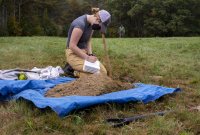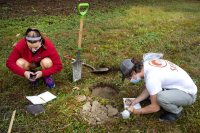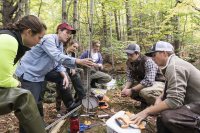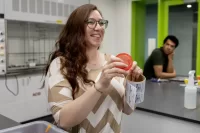
Environmental justice, degradation to be discussed
A historian from Colby College and two members of a farm labor coalition formed in response to harsh conditions at the former DeCoster Egg Farm offer lectures on environmental issues at Bates College on Wednesday, March 20, and Thursday, March 21. The lectures are free and open to the public.
Paul Josephson, associate professor in the Colby College history department, gives a talk titled The Destruction of Nature in Russia and the West at 4 p.m. Wednesday, March 20, in Room G65, Pettengill Hall.
Colby’s Russian and Soviet history professor, Josephson specializes in 20th century science and technology. His books include New Atlantis Revisited: Akademgorodok, the Siberian City of Science (Princeton University Press, 1997), which won the Marshall Shulman Book Prize of the American Association for the Advancement of Slavic Studies; and Red Atom (W. H. Freeman and Company, 1999), a history of peaceful nuclear programs in the former Soviet Union.
Jose Soto and Michael Hyde, of the Lewiston-based Maine Rural Workers Coalition, discuss the relationship between environmental justice and agriculture at 4 p.m. Thursday, March 21, in Room 204 of the Carnegie Science Hall.
The Maine Rural Workers Coalition was formed in 1997 at the DeCoster Egg Farm in Turner by workers, many of them immigrants, who sought to improve dangerous and inhumane conditions at the farm. Today the coalition promotes programs that help rural workers protect their health and safety, develop leadership skills and build communities that respect and celebrate their multicultural nature.
Soto, the organization’s executive director, and Hyde, its chemical and pesticide director, will discuss aspects of environmental justice relating to agriculture, with emphasis on the DeCoster story. Their appearance is part of U.S. Environmental Politics and Policy, a course in the environmental studies program.
Taught by Peter Rogers, an instructor in that interdisciplinary program, the course examines the development and current state of U.S. environmental policy at the federal, state and local levels, while placing such policymaking in the broader context of politics, economics and society.
Relating the students’ educational experience to current local issues is key to the environmental studies program at Bates. “It’s easy to think of environmental justice and agriculture workers’ issues as being distant and disconnected from life here,” says Rogers. “Jose Soto and his colleagues from the Maine Rural Workers Coalition are able to puncture this bubble by pointing what goes on in and around our community and elsewhere in Maine.”
For more information about the lectures, please call 207-786-6255.




